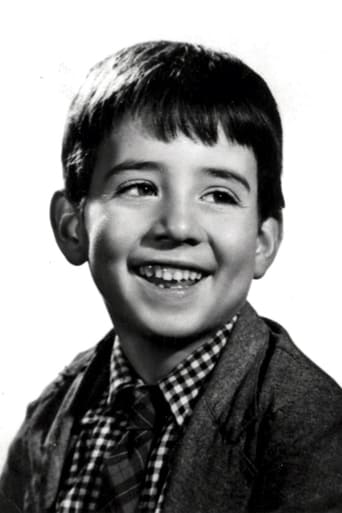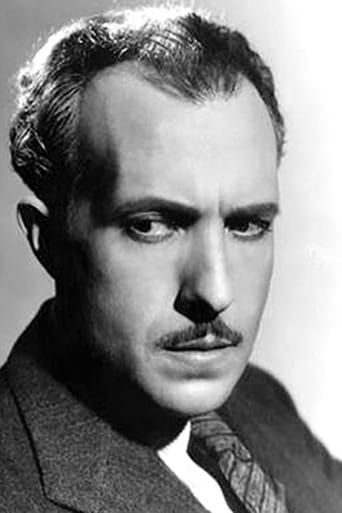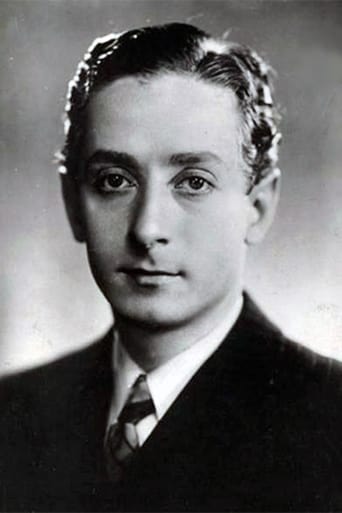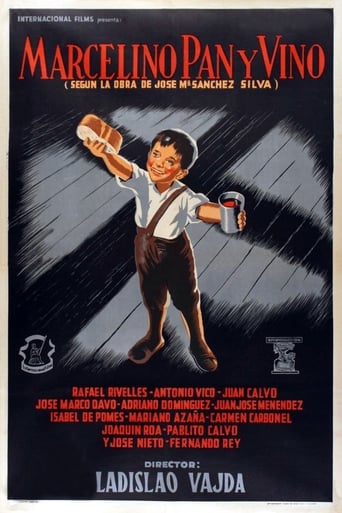
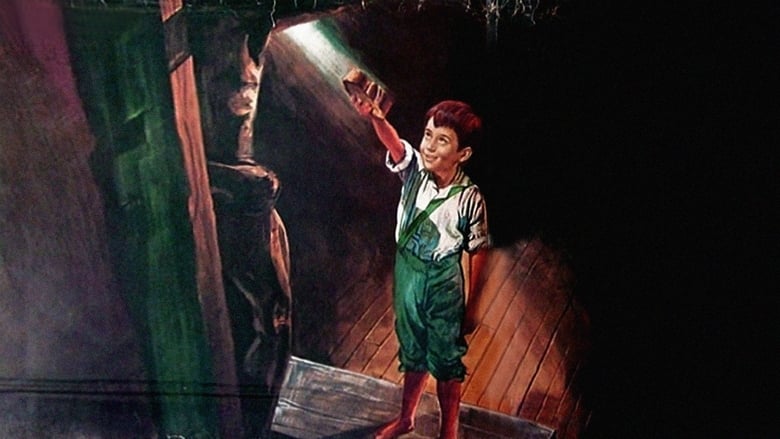
The Miracle of Marcelino (1955)
Left on the doorstep of a monastery as an infant, Marcelino was raised by the monks. He was well-cared for but lonely and missed having a mother. One day he found a special friend in the forbidden attic, hanging on a cross. A friend that would repay Marcelino's kindness by granting him one heart-felt wish.
Watch Trailer
Cast
Reviews
Very well executed
Simply Perfect
it is finally so absorbing because it plays like a lyrical road odyssey that’s also a detective story.
Good films always raise compelling questions, whether the format is fiction or documentary fact.
During a time of war in Spain, an orphaned infant is left at the door of a monastery. The monks are charged with finding a permanent home for him, but because they want to keep him, they don't try very hard. Finally they reject the mayor's demand that he be given the boy—even when the mayor threatens to evict the monks—and so they wind up raising him, calling him Marcelino. He grows into a rambunctious but likable lad who wonders why he doesn't have a mother like his village buddy Manuel. Though he's been forbidden from wandering up to the monastery attic, one day he does; there he finds a life-sized damaged wooden crucifix. At first, Marcelino is scared of it, but soon he begins talking to Jesus, going so far as to being bread and wine to the figure on the cross because he looks hungry. Suddenly, we see (from a vantage point behind the crucifix) the wooden arm of Jesus become human, taking the food and drink from the boy. The two share meals and chat, and when Marcelino tells Jesus that his fondest wish is to be reunited with his mother, Jesus makes it happen.SPOILER: Most reviewers of this film, especially ones of the Catholic persuasion, like it and find it heartwarming. As a former Catholic, I do have a soft spot for mystical religious fantasies (like THE BISHOP'S WIFE) and even the occasional non-mystical non-fantasies (GOING MY WAY). But this one, though well-made, comes off like a creepy Twilight Zone episode: Marcelino gets his wish because he dies. Off the top of my head (and aside from versions of LITTLE WOMEN in which the doomed child is more a supporting than starring role) I can only think of one other classic-era movie in which a central child character dies, the 1939 fantasy ON BORROWED TIME. I have to say that killing off a child whom you assume will live is an effective way to stun a viewer, and it works well in ON BORROWED TIME, but here, it just seems unsavory. The boy in BORROWED seems unhappy with his life on earth, but Marcelino does not—Jesus couldn't think of a better way to handle this kid's wish? I didn't dislike this movie—indeed, I would commend it for being different—but I think the people on IMDb who call it tender-hearted or inspiring or sensible either saw a different movie or need a dictionary.
I don't know and never knew many religious films, but despite my lack of knowledge on this sort of films, I can say that "Marcelino pan y vino" is a very good movie."Marcelino pan y vino" is one of those movies that conquers our hearts for its simplicity. It proves that it's possible to make great movies through a simple story. This is a beautiful but sad story. Simple but unpredictable and absolutely charming. Simple yet with a particular magical touch. Perhaps a sweet, innocent, heartwarming and emotional story? Of course! This movie is a great mix of emotions. Not to mention that the ending is completely unforgettable. Yes, it is that memorable. The soundtrack by Pablo Sorozábal is powerful and combines perfectly with the movie's nature.Although this movie is also known as "The Miracle of Marcelino", its title means "Marcelino bread and wine"."Marcelino pan y vino" is a Spanish film, beautifully directed by Ladislao Vajda. Let's be very, very frank: this is really one of the best foreign movies of all time. Luigi Comencini directed a remake of this in 1991 under the title "Marcellino" but I never saw that one.The actors are all great, but cute little Pablito Calvo steals the show as the title character, Marcelino. And those eyes of his are so expressive!This should definitely be on Top 250.
This is by far one of the best family friendly movies I have ever seen. The first time I saw it I was 8 years old and with my dad watching on an old reel to reel, it was his favorite movie also as he felt connected to it because he grew up in a boarding home for fatherless boys. The sound was terrible, the dubbing was way off, the footage was grainy to say the least, and there were a number of cracks in the reel. Despite all those imperfections, I loved every second of this film. For the longest time I could remember every detail about the movie but its name. I wanted to see it again but had very little information to research. One day I described the movie to a friend (this is something I always have trouble doing because I get so choked up), the friend jumped up and said "thats my dads favorite movie, he grew up an orphan" We went to her dad and he knew the name of the movie right away, from there it was just a question of finding it on media other then reel to reel. The first copy I picked up was on VHS, picture quality much better then the reel to reel but still bad. I was going to burn a back-up copy of my VHS version on DVD, but for a movie this great, I will just buy the DVD version, maybe the DVD will be a little better then the VHS version, at least I know I will have the DVD version for a lifetime. Regardless of the quality of the picture, you must see this film
When I first saw this film back in 1958, I was a somewhat pietistic adolescent and loved it and this sort of thing, as I had with "The Miracle of Our Lady of Fatima." I went to it a number of times, as a kind of masturbatory ritual that reveled in new Jesus sightings.I recently re-watched the film, for the first time in its original Spanish version, and while there are a number of things in the movie that are truly appealing, it can also be viewed as a fairly sickening piece of religio-lachrymose schlock. My feelings are actually rather ambivalent. I like the occasional poetry of the piece, which suggests Rossellini's great "Francesco giullare di Dio." I like winsome bug-eyed Pablito Calvo as Marcelino. He seems to have won the heart of Europe, if not the world, when the movie came out. His winsome innocence, innate goodness, despite all the Dennis the Menace pranks, are appealing, and his search for a real mother and a real friend has all the poignancy associated with the life of a lonely orphan. The "Marcelino song" sequence as the young boy gets up one morning is quite tender and beautiful. The music score itself is one I like.As for Jesus-in-the-attic sitting down to talk with Marcelino and accept his gifts of bread and wine and then take him (give him death) so that he can see his mother in heaven, that is frightening and sentimental treacle. Perhaps Jesus might have done better if he had come down in to save the Spanish in their fratricidal civil war instead or bring the Jews of Auschwitz to see his mother. It's interesting that Pope Pius XII received actor Pablito Calvo in a special audience and watched the film. It must have brought tears to his eyes, the eyes that looked away from the Jews at Auschwitz.Perhaps none of this makes sense or is even fair, but they are thoughts that went through my head as I re-watched the film from a new adult perspective.One interesting thing for me is the actor Fernando Rey, who appears at the start and finish as the "narrating" monk. Six years later in 1961 he would star in the very anti-clerical film of Luis Buñuel, "Viridiana," which leveled scathing criticism at exactly the kind of bathos dripping out of the treacle of Spanish and Latinate religiosity at its worst. Hmmmmmmmm! Come to think of it, a Spanish monk started the organization Opus Dei, marked by member self-flagellation and general fundamentalist intolerance.Watch "Marcelino" indeed. Enjoy it as I do much of it. (I've also seen the 1990s Italian version by Luigi Comencini, which is inferior to this one.) But examine the mind-set that produces this kind of thing and ask yourself some questions afterward.
